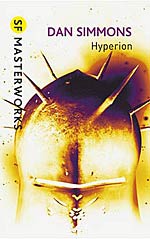
![]() DrPerschon
DrPerschon
12/31/2014
![]()
Were I to teach but one book in a course on Science Fiction, I would teach Dan Simmons' Hyperion. I would do so for the obvious reason that it was both the Locus and Hugo winner for 1990, and is a compelling and thought-provoking work of science fiction. But my reason for making it the best single work of fiction to teach science fiction is due to the book's form. Through the use of frame narrative and nested tales in open imitation of Chaucer's Canterbury Tales, Simmons is able to tell six individual tales with a seventh encompassing and binding narrative, which are exemplary of most of the areas I would cover in a survey course of Science Fiction.
If I could teach two books, I'd pair Hyperion with Heather Masri's anthology, Science Fiction: Stories and Contexts, using her divisions to classify the tales Simmon's pilgrims tell teach other. All of the stories deal with Masri's designation of "Time," but each also addresses one of the themes her text is organized around. Each of the stories in Hyperion is filled with rich intertextuality, drawing from multiple literary traditions: science fiction, English literature (John Keats, Beowulf, Romeo and Juliet to name a few), and Western religion (primarily the Tanakh and the Christian Scriptures), and so would work well in comparative/contrastive studies.
The first, the Priest's tale, is an example of Alien Encounters, and could be read alongside Bradbury's "Mars is Heaven!" and Stanley Weinbaum's "A Martian Odyssey," as well as Jorge Luis Borges' "Gospel of Mark."
The Soldier's tale is the only work that doesn't fit with one of Masri's designations besides "Time," but is obviously an example of Military SF (an area Masri avoids to some degree), which could be read in tandem with Fredric Brown's "Arena" and Carl Jung's "The Shadow."
The Poet's tale would fit well with "Utopias and Dystopias," while The Scholar's Story is definitely akin to Daniel Keyes' "Flowers for Algernon" which Masri has placed under "Evolutions." The Detective's Tale is an obvious homage to Isaac Asimov's Robot stories and William Gibson's cyberpunk works: Masri's collection includes Asimov's "Liar!" and Gibson's "Burning Chrome" in the section on "Artificial Life." And finally, the Consul's Tale is a fine example of "Disasters and Apocalypses."
The larger context of the stories would provide a discussion of Space Opera and Worldbuilding, making references to Asimov's "Foundation," but using Masri's inclusion of Ursula K. LeGuin's "Vaster than Empires and More Slow" to discuss the idea of far ranging futures like her 83 world collective of the Ekumen.
Masri's collection has an alternate table of thematic contents, and Hyperion touches on many of these as well, including "Race and Colonialism," "Class," "Nature and the Environment," but most importantly, "Religion." Simmons makes abundant references to the story of Abraham and the crucifixion of Christ.
It's a rare work of SF that has so much going on all at once, and a testament to Simmons' power as a writer, that his frame narrative and nested tales promise so much for a deep literary analysis. But beyond all of those headier notions, Hyperion is a compelling work of fiction: each story could stand alone in its own right, and still move me as a reader, the "Scholar's Tale" in particular, haunting me long after I finished reading it.
http://www.steampunkscholar.com